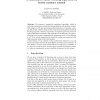Free Online Productivity Tools
i2Speak
i2Symbol
i2OCR
iTex2Img
iWeb2Print
iWeb2Shot
i2Type
iPdf2Split
iPdf2Merge
i2Bopomofo
i2Arabic
i2Style
i2Image
i2PDF
iLatex2Rtf
Sci2ools
123
click to vote
COLT
2006
Springer
2006
Springer
A Randomized Online Learning Algorithm for Better Variance Control
We propose a sequential randomized algorithm, which at each step concentrates on functions having both low risk and low variance with respect to the previous step prediction function. It satisfies a simple risk bound, which is sharp to the extent that the standard statistical learning approach, based on supremum of empirical processes, does not lead to algorithms with such a tight guarantee on its efficiency. Our generalization error bounds complement the pioneering work of Cesa-Bianchi et al. [12] in which standard-style statistical results were recovered with tight constants using worst-case analysis. A nice feature of our analysis of the randomized estimator is to put forward the links between the probabilistic and worst-case viewpoint. It also allows to recover recent model selection results due to Juditsky et al. [16] and to improve them in least square regression with heavy noise, i.e. when no exponential moment condition is assumed on the output.
Related Content
| Added | 20 Aug 2010 |
| Updated | 20 Aug 2010 |
| Type | Conference |
| Year | 2006 |
| Where | COLT |
| Authors | Jean-Yves Audibert |
Comments (0)

